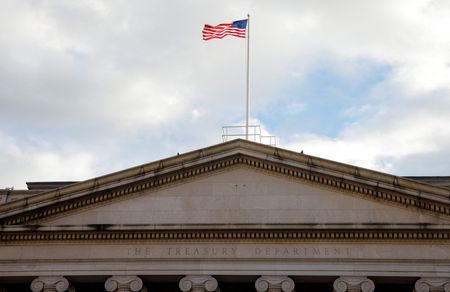 1
1 1
1
By David Lawder
WASHINGTON (Reuters) -The U.S. government reported a $176 billion surplus in April, down sharply from a year-ago record as revenues fell, the U.S. Treasury Department said on Wednesday as a June 1 deadline for a potential debt ceiling default drew closer.
The April surplus, which reflects tax filing season receipts, was down $132 billion, or 43%, from an April 2022 surplus of $308 billion, a record for any month that was fueled by massive COVID-19 spending and a strong stock market performance in 2021.
Revenues for April totaled $639 billion, the second-highest level since the April 2022 record of $864 billion, but a decrease of 26%. A U.S. Treasury official said the bulk of the decline was due to lower non-withheld individual tax receipts, reflecting lower stock market capital gains in 2022.
Individual withheld tax receipts for April grew 3% from a year earlier to $252 billion, while non-withheld taxes fell 34% to $358 billion. Corporate tax receipts also fell 11% to $85 billion and the Federal Reserve again had no earnings in April, after contributing $10 billion to April 2022 receipts.
Outlays for April also fell 17% to $462 billion, but rose 9% to $535 billion after calendar adjustments for payment timing shifts. April interest on the federal debt rose 27% from a year ago to $76 billion.
The Treasury official said that revenues in the year-to-date period were constrained by a $90 billion increase in tax refunds due largely to the Internal Revenue Service’s work in reducing its backlog of unprocessed returns that had piled up during the COVID-19 pandemic.
But the official declined to comment on the outlook for current and future revenues, including whether higher refund levels would continue.
The strength of revenues in May will be key in determining whether the Treasury will begin to miss some U.S. payment obligations without an increase in the $31.4 trillion statutory debt limit as early as June 1, or later in the summer, budget analysts say.
Treasury Secretary Janet Yellen has said the day of reckoning could be a number of weeks later, depending on receipts and outlays.
FDIC COSTS
The Treasury reported a $925 billion deficit for the first seven months of the 2023 fiscal year, a 157% increase from the $360 billion deficit a year earlier.
Year-to-date receipts totaled $2.687 trillion, down 10% from the record $2.986 trillion in the year-ago periods. Outlays for the first seven months totaled $3.611 trillion, up 8% from the $3.346 trillion in the prior-year period.
The Treasury official said that year-to-date outlays included $41 billion in Federal Deposit Insurance Corp costs related to the failures of Silicon Valley Bank and Signature Bank in March.
While costs associated with making uninsured depositors whole are paid from the Deposit Insurance Fund supported by bank assessments, for accounting purposes they count as Treasury outlays. But the FDIC payouts would allow for an additional $41 billion in borrowing capacity under the debt limit to replenish the cash paid out, the official added.
(Reporting by David Lawder; Editing by Andrea Ricci and Deepa Babington)